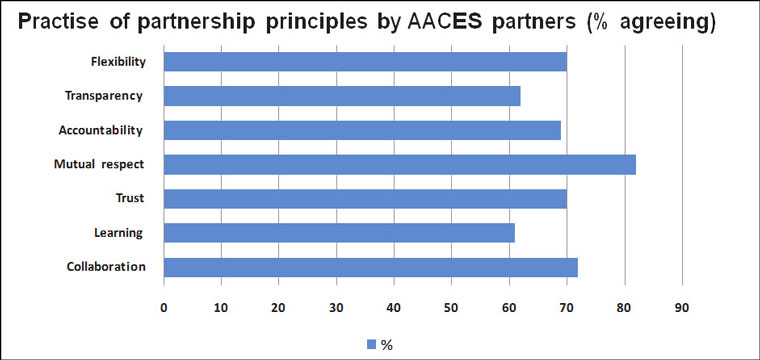Australia Africa Community Engagement Scheme (AACES) Annual Report 2012-13
Partnerships are a central feature of the AACES program. Partnerships exist between Australian NGOs and their African partners, among African partners and between the NGOs and the Australian Government. Beyond these are other important partnerships - for instance, between African NGOs and external partners such as local governments and other non-government organisations. In 2012–13, AACES partners continued to develop and strengthen relationships at these multiple levels.
Country partnerships
Building on work done last year, NGOs working in the same country strengthened their relationships through meetings to share experiences, opportunities and challenges. NGOs in Malawi, Tanzania and Kenya have established quarterly in-country meetings. Partners have taken advantage of these platforms to strengthen programming based on collective understanding of the country context. They also collaborated on issues where there is potential to jointly engage decision-makers and influence policy. For example, in Malawi, partners used the AACES platform to coordinate efforts to help women secure land rights, which is crucial to addressing the gender gap in land ownership. They also collaborated with other civil society organisations in the country to advocate for more government spending on WASH in the country's 2013–14 budget.
Sectoral and programmatic partnerships
NGOs working in the same sector jointly planned and delivered activities that resulted in time and cost savings, innovation and other tangible outcomes. World Vision and Marie Stopes International in Tanzania worked together to encourage longer-term methods of family planning that can lower maternal mortality.
NGOs also developed collaborative ventures for innovative and experimental activities that received funding through the AACES Innovations Fund. In Kenya, Marie Stopes International is partnering with Plan International to implement an integrated health and livelihood approach project to improve the well being of young mothers. ActionAid and World Vision partnered on a project to deepen engagement with youth as agents for change to improve the quality of services in rural areas.
Learning events, exchange visits, joint program reviews and training provided opportunities for partners to strengthen collaboration and improve programming. For example, following a monitoring and evaluation training workshop, AFAP adopted WaterAid Australia's advocacy scrap book16 methodology to improve its monitoring of advocacy and policy work. Staff from AOA's partner APDA in Ethiopia attended a training workshop on gender organised by CARE and shared lessons on what works in integrating gender and promoting women's participation in agriculture.
Australian Government sector specialists' participation in learning events facilitated linkages and built synergies between NGO activities and the broader objectives of Australia's aid program in Africa. The Australian Department of Foreign Affairs and Trade program staff valued the opportunity to learn about experiences and results of AACES activities in the areas of their expertise.
Working with other stakeholders
Partnerships under AACES go beyond program partners. NGOs collaborated with external partners to share practices and resources and influence policy. In Rwanda, World Vision, which is the only AACES NGO operating in the country, established a relationship with CARE Rwanda that has allowed them to strengthen their expertise in community-based advocacy. In Tanzania, CARE partnered with the Aga Khan Foundation and the National Agricultural Research Institute on research to improve access to extension services, farm inputs, credit and markets for smallholder farmers. In Kenya, Plan International partnered with Population Services International to organise mobile clinics.
NGOs continued to strengthen working relationships with governments to improve service delivery and strengthen policy. Marie Stopes International collaborated with the Ministry of Health and Social Welfare in Tanzania to draft the national youth behaviour change communication strategy. In Kenya, AOA's partner MUAC worked with the Ministry of Health to train community health workers to enhance community access to health services. In Ethiopia, AOA's partner APDA collaborated with government health personnel to jointly vaccinate children. In Tanzania, WaterAid shared research findings with the country's government that contributed to the adoption of a national school WASH strategy.
During the year, AACES NGOs partnered with organisations representing people with disability to raise awareness of the rights of people with disability, and educate communities and decision-makers to change attitudes, beliefs and policies. In Mozambique, AFAP's partner, Concern Universal, signed a Memorandum of Understanding with the Forum of Associations of Persons with Disability, an umbrella organisation in the disability sector. Both partners collaborated to launch the 'Say Yes to Inclusion' campaign in the country to advocate for equity and inclusion in government policies and budget.
AACES 2013 partnership survey
The second AACES partnership survey was conducted in April 2013 to capture views and perceptions of how the partnership operates in practice. The findings revealed that the AACES partnership principles of trust, flexibility, accountability, mutual respect, collaboration, transparency and learning are well applied. They also confirmed that relationships take time to develop and require a willingness of parties to be involved. The results of the survey were discussed in the AACES annual reflection meeting in June 2013. The discussions helped partners understand challenges and prioritise areas for further improvement. Key areas identified for focus include strengthening communication, learning and knowledge sharing between partners.
16. The scrap book is a tool used to track advocacy activities, such as meetings, research, or events undertaken to influence advocacy. This will then be monitored periodically to review progress or result of those activities.

